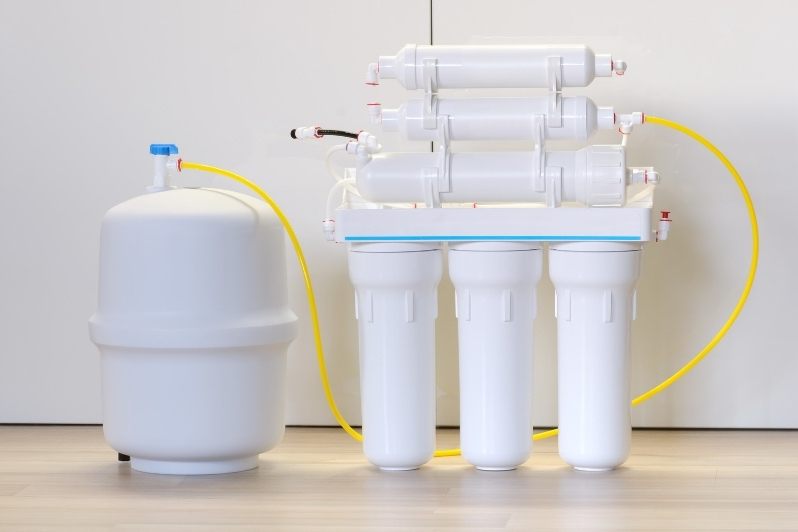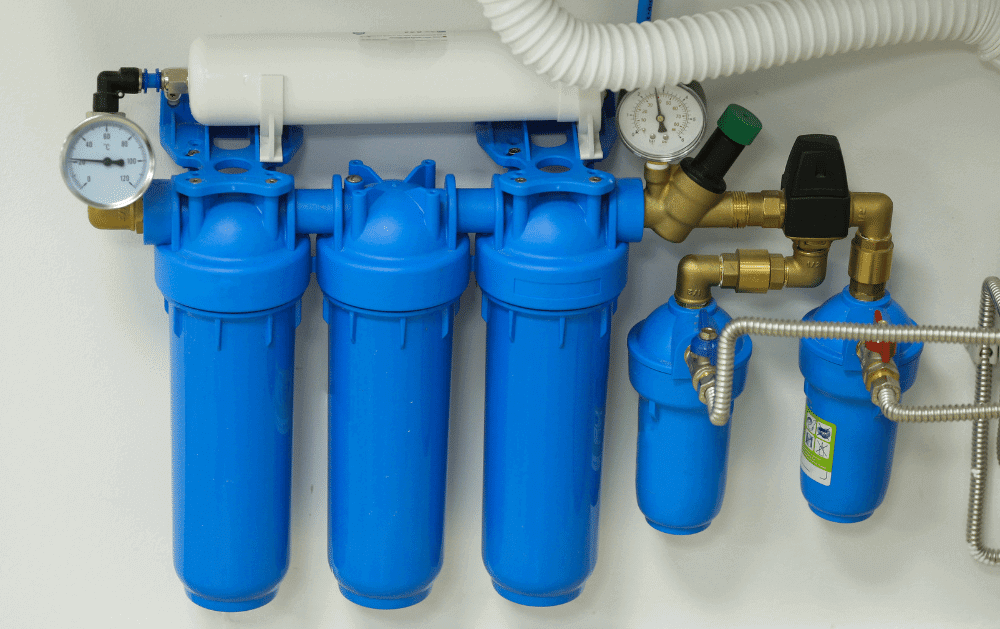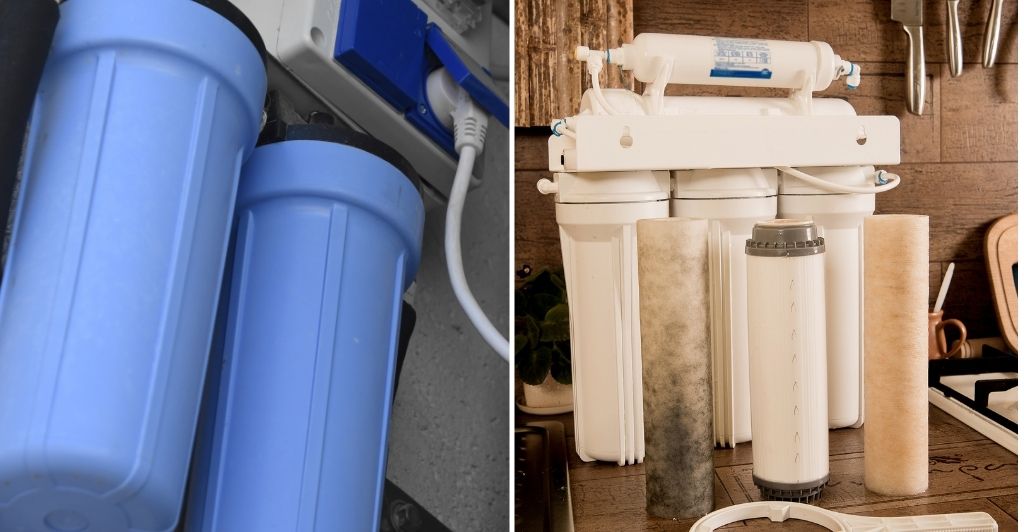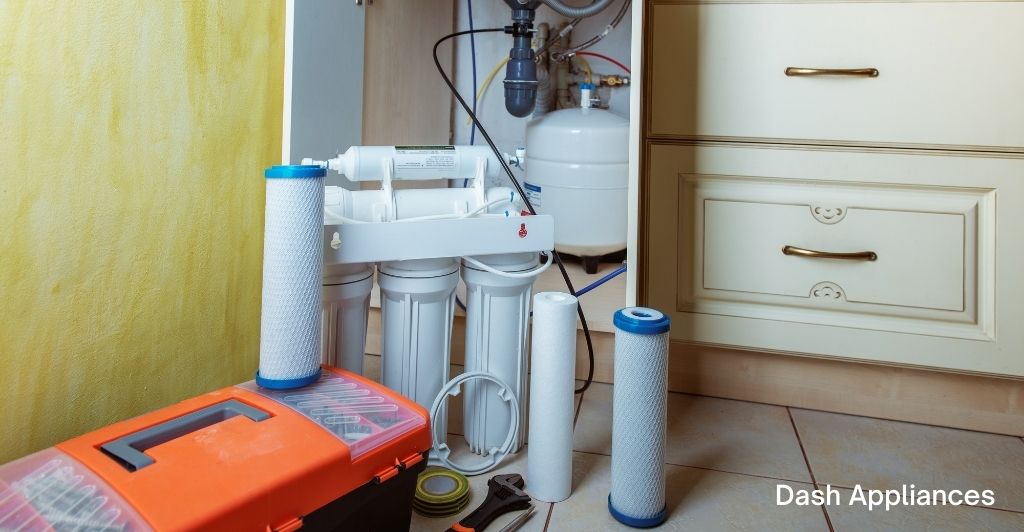Reverse Osmosis vs Whole House Systems — Which is Best?
Reverse osmosis systems are multi-purpose filters that work great in removing all harmful contaminants from water. They’re recommended if you only need clean water for drinking and cooking.
Whole house filters are best if you’re looking for soft water all around your home (in all the faucets and shower).
The process of filtering water is very crucial as it improves the quality of water that you consume and ensures that your drinking water doesn’t cause any health problems or diseases.
When you plan to install a filter in your house, you’ll observe that there are a variety of systems for you to choose from. So, which filter do you pick?
While there are many filtration systems out there, whole house water filtration systems and reverse osmosis systems are two of the most popular systems. Both of these systems aim to clean water, but they are very different from one another.
In this guide, we will break down the differences between reverse osmosis vs whole house filtration systems and we will also discuss their pros and cons in detail. Let’s start…
Reverse Osmosis Filtration
Reverse Osmosis is an incredibly beneficial as well as efficient method for purifying the water that comes into your house through taps. During this complete procedure, any inorganic solid matter reduces to a great extent.
The method aims to reduce the maximum amount of pollutants present in your water by purifying the liquid with the help of a semi-permeable layer.

This layer acts as a barrier for the water contaminants wherein a lot of them get discarded, however, some do not. Reverse osmosis, in simple words, is the backward procedure of the osmosis method.
It is worth mentioning that this specific kind of water filtration method is a truly popular choice that millions of household owners, as well as businessmen, make use of.
This is mainly because of the ability of this system to get rid of a considerable amount of harmful pollutants present inside the water.
Pros of Reverse Osmosis Systems
- Easy to Maintain.
- Removes arsenic, chlorine, sediment, fluoride, salt, and other harmful particles.
- Makes food and water taste better.
- Improves water quality.
Cons of Reverse Osmosis Systems
- The system can be damaged because of hard water.
- This system isn’t self-sustaining.
- RO filters can clog the whole water system.
- RO filtration system requires regular maintenance and filter replacement.
- If the RO filter membrane gets damaged, it allows any microorganisms and particles to pass.
- Reverse osmosis filtration system does not disinfect the water.
- Reverse osmosis systems have a very high installation cost.
- The RO filtration process is extremely slow as it uses very low pressure.
Whole House Water Filtration
The Whole House Filtration System works to remove water-borne bacteria like norovirus and legionella, disinfection of byproducts, get rid of hazardous fertilizer, and minimize fecal matter.

It cleans the water supply of your complete house and hence, it provides clean water for bathing, using appliances, and consumption. The capacity of a whole house water filtration system is 600,000 gallons.
Pros of Whole House Water Filtration Systems
- Whole House Systems make water-using appliances last longer.
- Removes pesticides, herbicides, sediment, and chlorine from water.
- It is easy to install a whole house water filtration system.
- This system lets you bathe in healthy and fresh water.
- Gets rid of bad smell and improves the taste of water.
Cons of Whole House Water Filtration System
- The installation cost of a whole house water filtration system can be anywhere around $300 to $2000. Other expenses are also added to this cost, making it very expensive in the beginning.
- This system can take up a lot of space as they are not at all compact. Hence, if you are short on space, you shouldn’t be using this system.
- This water filtration system not only filters contaminants, but it filters essential vitamins and minerals from the water too.
- This process of filtering water takes time and it can also cause a decline in the water pressure in your house. This can happen especially when the system’s filters start clogging.
What Contaminants are Eliminated by these Filters?
Reverse Osmosis System removes contaminants such as lead, copper, TDS, cysts, chromium 3, chromium 6, cadmium, barium, fluoride, turbidity, selenium, radium, and arsenic V.

The Whole House Filtration System gets rid of several contaminants, sediment, chloramines, chlorine, and other disinfectants soon after they are installed in your plumbing system. This system also has a very powerful effect on the plumbing infrastructure of your house and it can be good for those appliances that use water to function.
Adding UV protection to this filtration system will make it more beneficial as it will allow the system to kill pathogens, viruses, and bacteria. Moreover, whole house water filtration systems remove 99.9% of microorganisms like giardia, cryptosporidium, and E. coli.
Reverse Osmosis vs Whole House Filtration Systems — Key Differences
The water filtration systems with the reverse osmosis technique are mainly used to purify the water for drinking as well as cooking purposes. This is why they are generally installed underneath the faucet or the sink.

On the other hand, a whole house filtration system works to filter the complete water supply that is flowing into the house. This is why it is installed at the primary water line of the house.
Reverse osmosis water filtration systems are highly concentrated. They also function at a relatively slower pace. On the contrary, a whole house filtration system works to purify the water much faster. Using this kind of water filtration system in your house ensures that the water flows effectively and consistently throughout your house.
Lastly, a whole house water filtration system works to get rid of only some particular kinds of contaminants present in the water supply of your house. On the other hand, a reverse osmosis water filtration system works to lessen a vast amount of water pollutants from the water.
Hence, if you are looking for a decent water filtration system to ensure clean and healthy drinking water for your house, reverse osmosis works ideally.
How do I know which filter type is right for me?
It is vital to understand the benefits and drawbacks of both systems before you make the decision of purchasing the one that fits your needs.

RO systems reduce heavy metals, and the multiple stages present in the system ensure the removal of all the harmful particles found in water. It is convenient to use RO filters and they prove to be useful for providing clean drinking water.
If your purpose of purchasing a water filtration system is purified water, you should invest in a quality RO filter.
However, if you need an overall filtration system for your house, and you don’t have specific needs, a whole house water filtration system should be your go-to option. This system will provide clean water around your home and it will ensure that you consume and bathe in fresh and contaminant-free water.
Conclusion
Both reverse osmosis, as well as whole house water filtration systems, are a popular choice in households and offices today. They are both effective in their ways and it solely depends on you to choose from the two options.
If you are looking for an extensive water filtration system that works to purify water all around the house, a whole house water filtration system is the way to go.
On the contrary, reverse osmosis works great for filtering a large number of contaminants from your water and making it fit for drinking as well as cooking purposes.
FAQs
What are some disadvantages of getting reverse osmosis installed in the house?
One of the most crucial disadvantages of having reverse osmosis installed in your house is the significant wastage of water that comes along with the filtration process. For every gallon that it produces, around 5-20 gallons get wasted in the process.
Why do you need a whole house water filtration system?
The whole house filtration system works to eliminate hazardous contaminants from the water supply throughout your house. It is an all-in-one filtration system for not only drinking and cooking purposes but also for bathrooms. It helps to reduce the risks of any health issues caused by contaminated water to a great extent.
